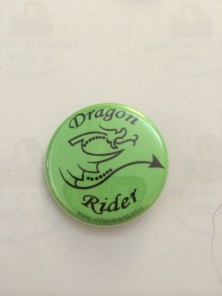The really funny part is every time I mention dragons, all my readers perk up their ears and start demanding release dates. (Hopefully November, and that's all I'm going to say about that. Now, hush, this is a post for my writer friends!) 😉

I've now completed my fifth book/story using Dragon Dictate as my dominant way to get words on the page. There's been a learning curve, and some of the mistakes I’ve made are classics, but in the end it's been pretty amazing.
There are always lots of questions every time I talk about my Dragon. My friend Maisey Yates also started using the tool, and she's written up her own post about the experience. You can find hers here if you're gathering information.
Like anything, though, writing is an individual experience. We all have things that we like, or that will work for us, along with the things that would drive us nuts. Every time there is a new tool mentioned in the writing world there is a lot of interest generated. For example, I know some people swear by Scrivener. The thought of that program makes my skin crawl. But when I think about it more thoroughly my reaction is because I already have my own organizational method, just not that one.
Could I learn to use it? Yes, if I had to.
Do I have to?
That's the approach I want to take in my post about Dragon. It's a neat tool, and it's really helped me a lot, but is it a tool that will work for you? Will it fit your needs?
For me, my wrists and elbows simply couldn't take the pace anymore. Over the past six years I'd clocked nearly 2 million words in writing my books, and that doesn't count rewrites, edits, blog posts, IM and chitchat with writer friends, and all fifty-three thousand tweets (oh, Lordy, I really didn't need to add that up!!)
The first time I tried Dragon Dictate, though, I gave up in frustration. As a dedicated pantser/don't read the instruction book, I didn't find it as intuitive as I hoped. I'm not quite sure how I write — I usually have some kind of target in my writing, and then this almost “magical” event occurs when I work. The story flows from my fingertips onto the screen, and that's when I find out what's actually happening. Attempting to duplicate that with Dragon left me stuttering. The magic wasn't there, and I had a deadline, so I shoved it aside and ignored it.
For whatever reason, three months later I grabbed it again. With yet another looming deadline it maybe wasn't the best time to make another attempt, but this time something clicked.
Dictating really is a different skill set. I know how to tell a story. I don't know how to touch-type, but I definitely have gotten better over the past five years. This time when I started to use Dragon a few things clicked.
1) Am I ever COMMA ever going to make this work QUESTION MARK
Part the first:
The idea of speaking in phrases instead of individual words finally made sense. I think the first time I was using Dragon I watched the words appear on the page, and I was trying to put them down like I would type. One. Word. After. Another. No. Matter. How. Fast. Or. Slow.
Very frustrating.
Dragon works best when you speak in phrases. Context clues helps it know which word you mean to use (which there or their). Now, when I type, it's as if I'm speaking to another person. Even if I don't know everything I want to say, the words come out in groups, and Dragon plops them down in the same way.
When I dictated the first line of this section, this is how I said it:
number one
comma
the idea
of speaking in phrases
instead of individual words
finally made sense
period
If reading that made you jittery, I understand. I had the same reaction the first time I tried Dragon. Keep reading…
Part the second:
Just like learning to play a wind instrument, the timing of breathing is a learned skill. In Dragon Dictate you verbally add punctuation, and at first it's like learning to take a breath between musical phrases. The music stutters, and you feel slightly awkward. But the more you do it, the more instinctive it becomes, and punctuation slips into those moments when you need to breathe anyway.
Practice. Practice. Practice.
2) The story is a mess…
Once I was less worried about punctuation, the second thing I realized was while I write fairly clean, I still spend time editing every line. When I sprint I can type up to 2000 words in an hour. I can't sustain that level for long, but when I'm in the groove, and I kind of know what I'm going to write about, that's my top speed.
And then, when I'm done, I go back through the entire 2000 words and clean it up. AutoCorrect does some of the work — I've trained my Word program to fix lots of my common typos — but the truth is at the end of an hour I still have at least fifteen minutes worth of work, if not more to get my manuscript tidied up.
Using Dragon increases my speed in some ways, decreases it in others, but in the end I still have to go back and tidy things up. It's coming to the point of realizing that while I know how to talk, I didn't know how to dictate. It's a new skill that takes training.
Now I am at the point that even though it feels as if I'm going slowly, the actual words go on the page quicker. At the end of an hour’s work I have dictated an average of 3000 words on a regular basis.
And then I go back and edit. Just like I would've had to after sprinting.
3) Finding the magic
When my daughter was learning to drive standard there was so much to think about. I've driven it for so long, but watching her practice brought back memories. You not only have to balance the clutch with the gas, watch out your rearview mirror, aim the thing in the right direction —
I knew what to expect when typing my story. Sometimes it would go fast, sometimes would go slow, but there would always be those times when I would finish and looked down at what I'd accomplished for the day, and be thrilled with the progress. Excited about the story taking shape almost magically.
When I started using Dragon I couldn't see the magic because I was concentrating on all the other details. Adding punctuation, worrying about enunciating properly, convincing the program I really didn't want it to start reading back what I had written. But the longer I've used Dragon, the less I see those things. The less they distract me because I do them automatically. And now I begin to see the magic once again as it happens.
I’ve just completed a collaborative project with Elle Kennedy. As I was working on one section, I suddenly found the story headed down the perfect path for that moment. The themes and phrases fell into place like dominoes tumbling into each other, and that was the first time I watched as I spoke the words onto the page and thought “oohhhh, this is good!”
It's not that I haven't “made magic” in the previous four books I used Dragon with, but this was the first time I was aware. I’ve reached the point of proficiency that I can not only get the words on the page, but I can enjoy the ride as well.
4) To infinity and beyond….
And now we get to some of the fun adaptations I've been playing with.
I have discovered I can strap my laptop to the top of my treadmill, plug-in my ear/mic, and walk while I dictate. Do I still need to clean up the manuscript when I'm done? Definitely. But I never would have been able to type while on the treadmill, so I'm really stoked about this.
I haven't found a Bluetooth headset yet that will give me total mobility, but the new thing I’m trying is a transcription device. I successfully used the phone-sized recorder the other day, recording four different fifteen-minute dictation sessions while I was out of the house. When I did get back to my office and plug in the device, it was fascinating to watch the audio transfer onto the word doc. My goal is to plug in my headset to the recorder and go for long walks. I live in the country so I can get away with being the crazy lady who talks to herself all the time.
I'm learning to use Dragon more effectively while doing blog posts and answering my mail. I don't use it to do edits, although I know you could. I find I still go much quicker by hand. I can use Dragon on twitter, but I’m less likely to use it on IM because the typos I get are hysterical.
Idiosyncrasies:
Dragon Dictate doesn’t like the way I say “oh”, which means every time I say it, at least half the time I end up with a random word being bolded. (i.e. it thinks I’m giving the order to put the word in bold.) There’s a way to turn this off, but I can also just tell the program ‘undo'. Plus, it's now making me more aware of how often I use that word. It's one I often cut in edits, so learning not to say it in the first place isn't a bad thing.
Dragon doesn’t like the way I pronounce some of my hero/heroine names. There is a way to teach Dragon what I mean, but when I'm in a hurry I use the same solution I would use when I'm typing and I can't remember how to spell a word. I slip in a substitute name, or XXX, and later use find/replace when I’m editing.
~~**~~
That's enough for now!
Overall, it's been quite the adventure, and I, and my wrists, are very glad it worked in the end. Physically this was something I needed to figure out. From the standpoint of using the treadmill, and getting to go for walks, I'm even more thrilled.
If you are considering trying the dictation program, I will mention that the built-in program on the Mac was nothing like using Dragon. Remember how frustrated I got with Dragon the first time I tried it, and how much I like it now? My attempt to use the built-in dictation was five hundred times more frustrating than the first attempt with Dragon. Also, there's a Dragon Dictate out for the iPad — again, not something that worked for me. So those are the things you're trying I think you’ll be fighting an uphill battle to enjoy the product.
Will Dragon triple your productivity? I'm not sure. It's helped me reach my goals, and there are certain bonus side effects such as I can't eat or drink while using it 😉 but it's not magically writing the books for me.
I'm working on that one though. I'll let you know if I figure out the magic key that unlocks that section of the tool.
Nowadays there is lot of unforeseen circumstance which force folk to take remedies. You can order medicines directly your office. In these latter days the stock you can find in online pharmacy is actually high. Some medications are as a rule used to treat many types of bacteria, such as tonsillitis and infections of the throat. Other ones are used to treat diabetes. Cialis is a remedy used to treat divers afflictions. What do you have to know about cialis order online? Presently many families search for the exact keyword ordering cialis online on the Internet. Perhaps you already read something about it. Having erectile dysfunction can beyond doubt complicate romance. What can cause erectile dysfunction? A row of psychological issues can produce erectile dysfunction. What should you discuss with a physician before taking Cialis? Any treatment may cause dangerous side effects. Sometimes side effects can be actually dangerous. Talk to your pharmacist about the proper disposal of your medicine.













Great post. Came here from Kindle Boards. This is exactly the knowledge I was looking for. Thank you!
So, just for the nuts and bolts of it – you create something in Pages, or Word, or (which program is best?) then turn off the Dragon and just edit as normal? Then paste into your blog software, or Scrivener (I’m one of those who love Scrivener)? And that’s it?
Also,my instinct says that I want to add punctuation and ‘returns’ with the keyboard so i don’t have to say “New Paragraph” and break the flow. Can you do that? Or are you saying you just get used to working a new way.
Thanks again! Terrific post!
🙂 Answered at KBoards, but thanks for checking out the post here!
Very helpful! I also came here from your note on the KBs. And I’ve played with Dragon and the Mac dictate version a bit and read more books than I care to mention by people who are using dictation (mostly for nonfiction). You are the first person to actually go into some the ‘learning skills’, which is very helpful! I totally get the elbow & wrist predicament, wish I didn’t 🙂 So I need to embrace this somehow. I’ve also done the dictating while walking and driving for years, but always had to transcribe it myself–looking forward to adding that to he Dragon skill set. Thanks again and good luck with the release of your latest book!
Thank you, Kate, and good luck with it. I’m very much appreciating having a new tool in my toolbox!